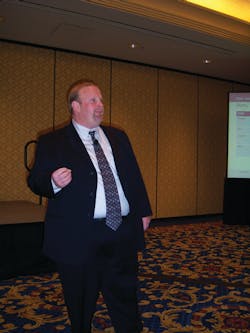Q: Do I really need training? I can already do what I need to do and the trainers often don't work on the new cars.
A: Buying training is just like buying tools. You do it if it will make you money.
There tends not to be a lot of training in how to do mechanical work. The only way you will ever be able to do a timing belt* or rebuild a differential is if someone does it with you, on the job. MEAtraining.com has, from time to time, offered webcast training classes on “doing timing belts without dealer tools,” and the like. ChiltonPRO also is a repair information database that will include videos of repair procedures. Information like this can often be useful. Worldpac’s online forums are another good source for Euro-specific mechanical tips.
But what if you want to learn how to use your meter or scan tool? Now you are stuck needing training, because no one is born an electrician or diagnostician. You need to go to a class and learn from someone who has an entirely different skillset from you.
A lot of guys buy meters and blow fuses and use scan tools, but do not know how to do a quick volumetric efficiency test or know what "fuel trim" is. Why waste money on all these tools if you cannot read the wiring diagram or understand the theory and operation of a system?
This is when you’re forced to invest in your training. Just use discretion with trainers. Oftentimes, they do not work on cars anymore but they understand fundamentals. These things might help you. Sometimes it is not a bad idea to speak to a really good technician you know and offer to pay him to teach you how to use a labscope, for example. Chances are he will be so honored he’ll take you on for free.
*In some cases, technicians have been able to do their own timing belt or clutch with only the aid of YouTube. But beware: YouTube has a lot of mechanical tips from DIYers.
Q: What sort of training do I really need?
A: Training generally comes in seminar or hands-on forms. We’ll talk about hands-on classes in a little bit, but first we will focus on seminars.
Oftentimes, you will need to go to seminar training that is topical: driveability, electrical, hybrids, anti-theft deterrent systems, etc. This training is good if you are looking to learn generalized information to help make you a more well-rounded technician and quicker at work.
Providers of this type of training include Technicians Service Training, Automotive Training Group and Automotive Research and Design, LLC. They tend to bring in different instructors and hold classes throughout the country.
Yet another useful provider of training is Worldpac, but they offer vehicle-specific training. For example, they might have a class on just Mercedes hybrids or BMW body systems. People always use the excuse, “I never see that stuff,” but if you work on BMWs you never know when you are going to run into an inoperative power window or whatever else. You don’t always get brakes and oil changes.
Some technicians who do not have training in their area will fly to national training events where the training provided tends to be more vehicle-specific and advanced. Autologic (the European scan tool company) holds an annual event on several different car lines, and ASA’s VISION in Kansas City, Mo. brings the country’s best automotive instructors all in one place, just to name two such outfits. AAPEX and SEMA, which will hold their annual conventions in Las Vegas in November this year, also hold training.
Vehicle-specific training is important because it helps make you an expert. Oftentimes, the trainers have the factory scan tool or work in OEM dealerships, so they know certain OEM specifications or are aware of certain pattern failures that help you fix a particular car. Vehicle-specific training tends to be expensive, however.
Q:For the beginners, is automotive college the only way to get into auto repair?
A: College is not the only way to become a better technician. Most technicians get started being an apprentice and doing the jobs no one wants to do, such as mopping the floors and driving customers around. Then an apprentice will begin learning how to do oil changes, brakes and tires. After a few months of doing this, most technicians are taught exhaust and suspension. During this process, a technician needs to become faster, learn not to make mistakes and buy his own tools.
The technicial skills that a college offers, such as the fundamentals of electricity, may be more relevant and easier to learn after working in a shop for a few years. Young techs generally have to wait years before they will be doing any real diagnostics, anyhow. So there are benefits to getting one's feet wet first and then going to school.
Q: What are the benefits of hands-on training?
A: Scientifically speaking, the human mind processes and remembers information best by doing something. It works better at retaining information practicing a skill versus hearing or reading about it.
Why? Probably the same reason people enjoy a concert from a band more than an album. Experiencing something live creates greater engagement.
Just as concerts cost more than albums, so does hands-on training. An instructor that teaches automotive electric or driveability diagnostics on live vehicles over the course of days can be a real asset. This is a valuable opportunity for the technician still learning (or forgetting!) his stuff. It is easily worth hundreds of dollars, because it teaches technicians how to really get started diagnosing vehicles.
Q: What training is available on DVD or online?
A: A good way to save money is to watch seminars online or on DVD. If the topic is good, it is worth it, as long as the technician can stay focused.
There are two providers of modestly priced DVDs and webcast training. Technicians Service Training (TST) provides live seminars and records those seminars on DVD and simulcasts them live on the Internet for a fee. The Automotive Video Institute and Automotive Training Group also offer DVDs.
As for webcasts, similar to TST, the Mechanic's Education Association also has webcasts that cover a lot of hot topics. If you are in New Jersey, they also do live classes that members can attend.
VehicleServicePros.com also regularly holds webcast training.
YouTube has a lot of short (and free) video clips that are good for learning purposes. Wells Vehicle Electronics’ channel (“Wells Tech”) and OTC’s (“OTC Tool Guy”) have a lot of good diagnostic information, for example.
Online training is also available from the National Institute for Automotive Service Excellence and from a company called Delmar Cengage Learning. Delmar Cengage Learning offers complete training programs online for auto repair chains.
Even if a technician does not work for one of these chains, the same technology is available to everyone seeking to hone their skills for the ASE exam. DelmarTechnicianTestPrep.com offers online test prep with remediation and a timed simulation of the exam. This is more like the real thing because the ASE test is computer-only these days. They also have the Medium/Heavy Duty and Autobody ASE exam prep materials as well.
There are plenty of training resources available for technicians looking to improve their skills.
Have questions? Need answers? Email [email protected] to have your questions answered in this column.

